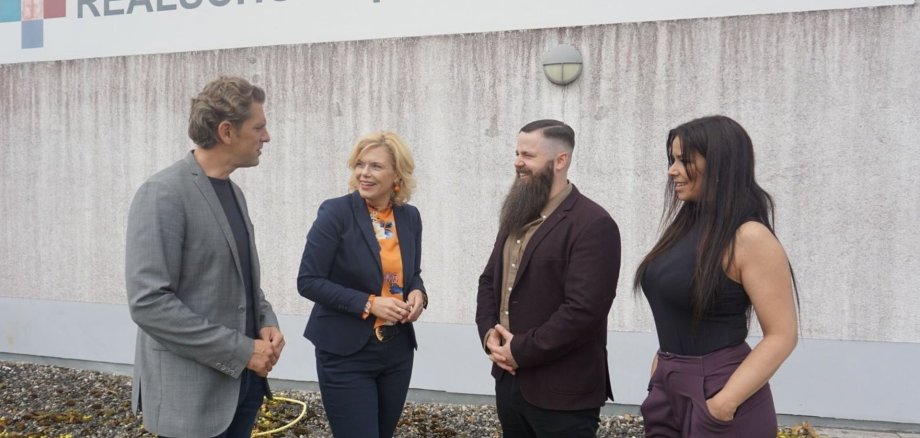For the ninth grade students at the Realschule plus in Idar-Oberstein, it wasn't math or German that was on the timetable, but politics - in a very real way. Julia Klöckner, local member of the Bundestag and economic policy spokesperson for the CDU/CSU parliamentary group, paid a visit to the school. She was accompanied by her colleague from the neighboring constituency of Mosel/Rhein-Hunsrück, Dr. Marlon Bröhr MdB. At the invitation of the school, the two members of the Bundestag were available to talk to the pupils and discuss current issues. They talked about Europe, the security situation in Germany and economic development. But also about integration challenges. The Realschule plus has been a language support center for pupils with no knowledge of German since 2015 and has a migration rate of over 80 percent. One of the classes that the two CDU politicians spoke to that day had only pupils with a history of migration. Over 370 pupils are currently taught by 43 teachers. They are supported by other educational specialists. Before starting the discussion with the classes, Julia Klöckner and Dr. Marlon Bröhr met with the principal, Christian Back, and vice-principal, Julia Molter, for a brief exchange about the special challenges facing the school. The two have been at the school for just under a year. "Different cultures, religions and languages come together in the classes - that harbors the potential for social conflict," reports Christian Back. As teachers, we try to create a place where the focus is on learning together." Another focus of the discussion was intensive language support, which is of central importance for the integration and academic success of the pupils. The "Auf der Hohl" secondary school has been a bilingual school since 2018. Pupils have the opportunity to attend bilingual history lessons from Year 7 onwards. Preparation for this starts in Year 5 with the voluntary offer of an additional English lesson per week. Christian Back: "We see languages as a gateway to the world. That is why it is not only important for us to provide intensive support for children and young people with a migration background, but also to learn foreign languages." Julia Klöckner and Dr. Marlon Bröhr then split up to talk to the ninth-grade classes about their political work in the German Bundestag. After some initial reticence, the pupils, who come from more than ten different countries, opened up. "Why are you taking the time to come to our school?" asked one pupil. "Because it's important to me to get young people interested in politics and our democracy," said Julia Klöckner. Democracy thrives on the participation of all citizens. "When young people are politically interested and engaged, they help to strengthen and stabilize democratic processes. The decisions of today shape the society of tomorrow. Young people who get involved in politics can help shape the direction of social and political development and ensure that their interests and perspectives are taken into account." Christian Back also sees it this way: "We have set ourselves the goal of producing responsible citizens who support the continued existence of our democracy. It's about living freely in a democracy.
Some of the young people come from Afghanistan, Syria or Somalia. "In a democracy, everyone is worth the same, regardless of whether they are women or men, young or old," explained Julia Klöckner. Everyone also has the right to express their thoughts and ideas freely without fear of reprisals. Furthermore, not only the rights of majorities are protected, but also those of minorities. However, it is also clear: "Clear rules apply here in Germany, there are not only rights, but also duties. And conflicts are not resolved by force." The politician was impressed by a Ukrainian boy and a Russian girl who deliberately sit next to each other in their class and get on well and support each other. Julia Klöckner wanted to know whether they already had a career aspiration. "Architect, surgical assistant, painter and varnisher," the pupils shouted back at her.
Julia Klöckner after the visit: "The Realschule plus makes a valuable contribution to the integration and education of young people. It is inspiring to see how much passion is put into the work here. The schools and teaching staff definitely need more support from the state in order to get through the content. After all, what is being done here is not a traditional teaching job. However, we can also see that local authorities and institutions are at the limits of their capacity when it comes to immigration." Everyday school life is anything but easy. Nevertheless, the teaching staff and pupils have mastered it together.
The visit by Julia Klöckner and Marlon Bröhr underlines the recognition and support for the outstanding work of the Realschule plus. The CDU politicians emphasized that such initiatives can further strengthen the integration and educational opportunities of children and young people with a migration background.
